三大从句的翻译与特殊句型
英语中三大类从句

从句概述
• 从句只能做主句的某一部分,依附于主句 而存在,不能独立。
• 从句也具有句子的特征,即有自己的主 谓结构;而且带有引导词。
• 根据从句在句中的作用,可分为名词性 从句、形容词性(定语)从句和副词性 (状语)从句三类。
一、名词性从句
名词性从句包括主语从句、宾语从句、表语从句和同位语从句。其关 联词有连词that, if, whether;连接代词what, who, which和连接副 词when, where, why, how等。
Ryan was worrying about whether he had hurt her feelings. ⑶ or not紧随其后时;I don’t care whether or not he has a holiday. ⑷ 后接不定式时。 She can’t decide whether to go.
连接词的用法 (三)
3.Who, whom, whose, what, which
连接代词Who, whom, whose, what, which等 在从句中既起连接作用,又担当主语、宾语、表 语等成分,并保留其特殊疑问词词义。如:
No one knows who he was waiting for. Tell me whose house it is. Let me know which train you will be arriving on.
④ It +v. (seems / happened, etc. )+that-clause It seems that Alice is not coming to the party at all. It happened that I was out that day.
初中英语从句语法总结
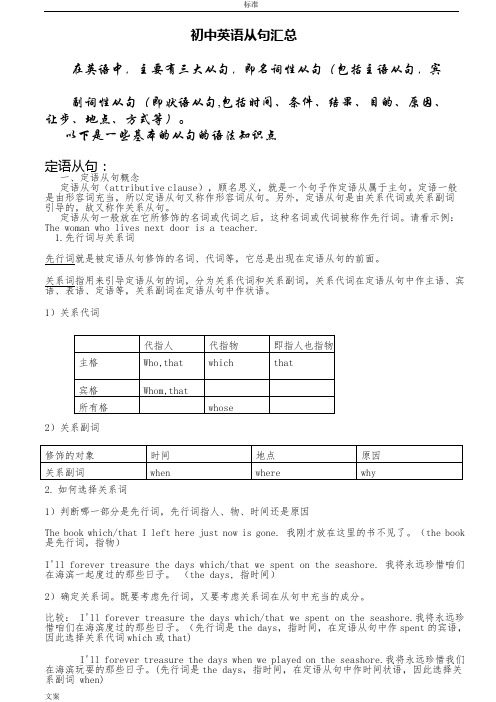
初中英语从句汇总在英语中,主要有三大从句,即名词性从句(包括主语从句,宾副词性从句(即状语从句,包括时间、条件、结果、目的、原因、让步、地点、方式等)。
以下是一些基本的从句的语法知识点定语从句:一、定语从句概念定语从句(attributive clause),顾名思义,就是一个句子作定语从属于主句。
定语一般是由形容词充当,所以定语从句又称作形容词从句。
另外,定语从句是由关系代词或关系副词引导的,故又称作关系从句。
定语从句一般放在它所修饰的名词或代词之后,这种名词或代词被称作先行词。
请看示例:The woman who lives next door is a teacher.1.先行词与关系词先行词就是被定语从句修饰的名词、代词等,它总是出现在定语从句的前面。
关系词指用来引导定语从句的词,分为关系代词和关系副词,关系代词在定语从句中作主语、宾语、表语、定语等,关系副词在定语从句中作状语。
1)关系代词2)关系副词1)判断哪一部分是先行词,先行词指人、物、时间还是原因The book which/that I left here just now is gone. 我刚才放在这里的书不见了。
(the book 是先行词,指物)I'll forever treasure the days which/that we spent on the seashore. 我将永远珍惜咱们在海滨一起度过的那些日子。
(the days, 指时间)2)确定关系词。
既要考虑先行词,又要考虑关系词在从句中充当的成分。
比较: I'll forever treasure the days which/that we spent on the seashore.我将永远珍惜咱们在海滨度过的那些日子。
(先行词是the days,指时间,在定语从句中作spent的宾语,因此选择关系代词which或that)I'll forever treasure the days when we played on the seashore.我将永远珍惜我们在海滨玩耍的那些日子。
高中英语从句之主语从句讲解(特殊句式系列)
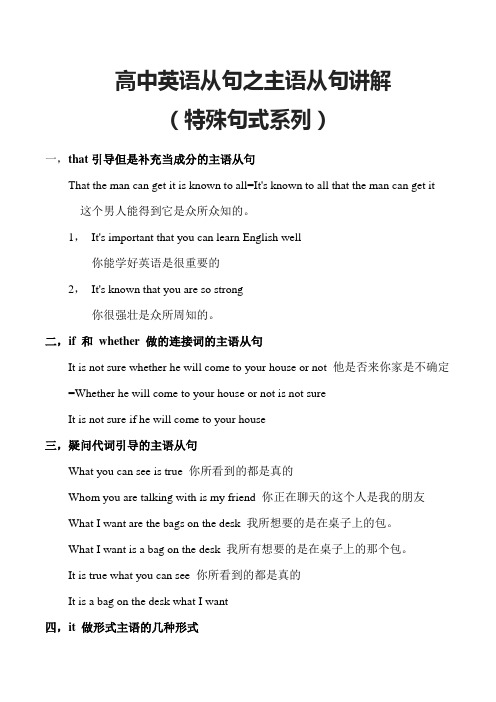
高中英语从句之主语从句讲解(特殊句式系列)一,that引导但是补充当成分的主语从句That the man can get it is known to all=It's known to all that the man can get it 这个男人能得到它是众所众知的。
1,It's important that you can learn English well你能学好英语是很重要的2,It's known that you are so strong你很强壮是众所周知的。
二,if 和whether 做的连接词的主语从句It is not sure whether he will come to your house or not 他是否来你家是不确定=Whether he will come to your house or not is not sureIt is not sure if he will come to your house三,疑问代词引导的主语从句What you can see is true 你所看到的都是真的Whom you are talking with is my friend 你正在聊天的这个人是我的朋友What I want are the bags on the desk 我所想要的是在桌子上的包。
What I want is a bag on the desk 我所有想要的是在桌子上的那个包。
It is true what you can see 你所看到的都是真的It is a bag on the desk what I want四,it 做形式主语的几种形式1,常用形容词:Certain 明确的,clear 清晰的,important重要的,natural自然的,necessary 必要的,obvious明显的,unbelievable 难以置信的,strange 奇怪的,unlikely不可能的,right 正确It is unlikely that you can lift the big stone 你能举起这个大石头是不可能的。
英语的三大从句语法讲解

英语三大从句在英语中,主要有三大从句,即名词性从句〔包括主语从句,宾语从句,表语从句,同位语从句〕、形容词性从句〔即定语从句〕、副词性从句〔即状语从句,包括时间、条件、结果、目的、原因、让步、地点、方式等〕。
定语从句一、关系代词引导的定语从句关系代词代替前面的先行词,并且在定语从句中充当句子成分,可以作主语、宾语、定语等。
常见的关系代词有:who, that, which。
它们的主格、宾格和所有格如下表所示:〔一〕关系代词who, whom和 whose的用法who代替人,是主格,在定语从句中作主语。
An architect is a person who designs buildings. 建筑师是设计房屋的人。
whom代替人,是宾格,在定语从句作宾语,在非正式英语常可省略。
Do you know the gentleman whom we met in the school library yesterday? 昨天我们在学校图书馆里遇到的那位先生你认识吗?whose一般代替人,有时亦可代替物,是所有格,在定语从句作定语。
The girl student whose father is a senior engineer used to study abroad. 其父是一位高级工程师的那个女学生过去在国外留学。
Do you know the name of the hotel whose window we can see here? 我们这儿能看到窗户的那个宾馆叫什么名字,你知道吗?〔关系代词whose指代先行词hotel,正式用法应该用of which。
whose window=the window of which,意思是:the window of the hotel。
〕〔二〕关系代词which的用法which代替物,在定语从句作主语或宾语,作宾语时还可省略。
I do not like stories which have unhappy endings.我不喜欢有不幸结局的小说。
英语三大从句

英语三大从句LELE was finally revised on the morning of December 16, 2020复合句【语法要点】复合句是由一个主句加一个或几个从句所构成的句子。
从句只用作句子的一个成分,不能独立。
根据从句在句子中的作用,可分为名词性从句、定语从句和状语从句三类。
(一)名词性从句名词性从句包括主语从句、表语从句、宾语从句、同位语从句。
其关联词有连接词that、if、whether;疑问代词who、what、which和疑问副词when、where、how、why等。
1)if不能引导表语从句。
连接代词who、what、whose、which不能引导同位语从句。
2)有时as、as if/though、because也可以引导表语从句,能跟表语从句的谓语动词一般为系动词be、seem、look等。
例如:Things are not always as they seem to be.事情并不总是像表面上看来的那样。
It looks as if it were going to rain. It is because you eat too much.3)介词宾语不可以用which来引导,而要用what来引导。
例如:We can learn what we did not know. He will talk to us about what he saw in the .4)连词that引导的名词性从句除能用在except、but、in后之外很少作介词的宾语,。
其它一些介词的宾语从句如果由连词that引导,则需用it先行一步作形式宾语。
例如:He is a good student except that he is careless.You may depend on it that they will support you.5)若主句谓语动词是及物动词make、find、think、see、hear等,则把宾语从句置于宾语补足语之后,用it作形式宾语。
高中英语语法专题讲义:三大从句
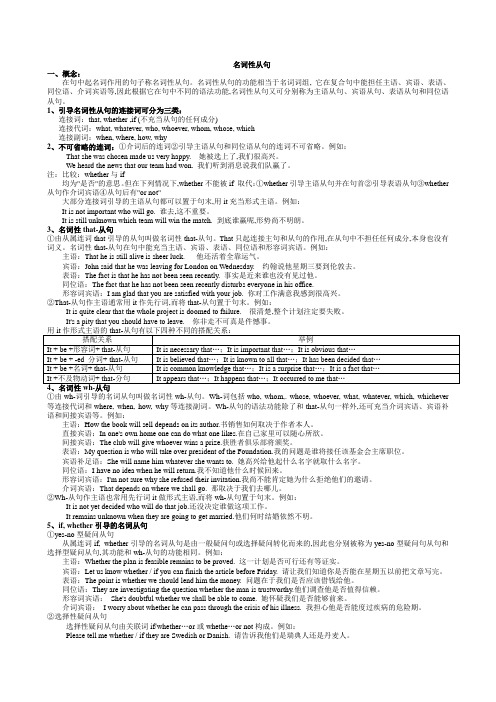
名词性从句一、概念:在句中起名词作用的句子称名词性从句。
名词性从句的功能相当于名词词组, 它在复合句中能担任主语、宾语、表语、同位语、介词宾语等,因此根据它在句中不同的语法功能,名词性从句又可分别称为主语从句、宾语从句、表语从句和同位语从句。
1、引导名词性从句的连接词可分为三类:连接词:that, whether ,if (不充当从句的任何成分)连接代词:what, whatever, who, whoever, whom, whose, which连接副词:when, where, how, why2、不可省略的连词:①介词后的连词②引导主语从句和同位语从句的连词不可省略。
例如:That she was chosen made us very happy. 她被选上了,我们很高兴。
We heard the news that our team had won. 我们听到消息说我们队赢了。
注:比较:whether与if均为"是否"的意思。
但在下列情况下,whether不能被if 取代:①whether引导主语从句并在句首②引导表语从句③whether 从句作介词宾语④从句后有"or not"大部分连接词引导的主语从句都可以置于句末,用it充当形式主语。
例如:It is not important who will go. 谁去,这不重要。
It is still unknown which team will win the match. 到底谁赢呢,形势尚不明朗。
3、名词性that-从句①由从属连词that引导的从句叫做名词性that-从句。
That只起连接主句和从句的作用,在从句中不担任任何成分,本身也没有词义。
名词性that-从句在句中能充当主语、宾语、表语、同位语和形容词宾语。
例如:主语:That he is still alive is sheer luck.他还活着全靠运气。
三大从句讲解及练习(附有答案)
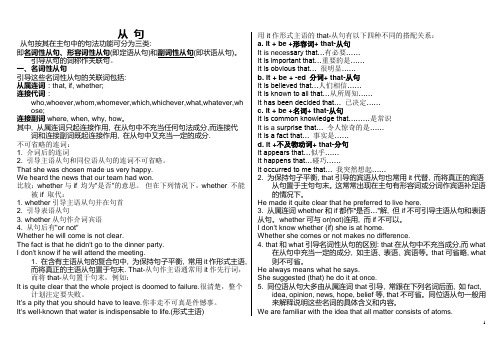
从句从句按其在主句中的句法功能可分为三类:即名词性从句、形容词性从句(即定语从句)和副词性从句(即状语从句)。
引导从句的词称作关联句。
一、名词性从句引导这些名词性从句的关联词包括:从属连词:that, if, whether;连接代词:who,whoever,whom,whomever,which,whichever,what,whatever,wh ose;连接副词where, when, why, how。
其中, 从属连词只起连接作用, 在从句中不充当任何句法成分,而连接代词和连接副词既起连接作用, 在从句中又充当一定的成分.不可省略的连词:1. 介词后的连词2. 引导主语从句和同位语从句的连词不可省略。
That she was chosen made us very happy.We heard the news that our team had won.比较:whether与if 均为"是否"的意思。
但在下列情况下,whether 不能被if 取代:1. whether引导主语从句并在句首2. 引导表语从句3. whether从句作介词宾语4. 从句后有"or not"Whether he will come is not clear.The fact is that he didn't go to the dinner party.I don't know if he will attend the meeting.1. 在含有主语从句的复合句中, 为保持句子平衡, 常用it作形式主语,而将真正的主语从句置于句末. That-从句作主语通常用it作先行词,而将that-从句置于句末,例如:It is quite clear that the whole project is doomed to failure.很清楚,整个计划注定要失败。
中考英语二轮复习三大从句

handsome是: 定语 ,作用是 修饰后面的名词boy。
her是: 定语 ,作用是 修饰后面的名词friend 。
2)The handsome boy who is singing is her friend.
请翻译此句:这个正在唱歌的帅气男孩是她的朋友 。
此句中,who is singing作为 定语 成分,作用是 修饰前面的名词boy 。
1、理解“定语”: 定语是用来修饰、限定、说明名词或代词的品质与特征的。
分析以下例句的句子成分:
1)The handsome boy is her friend.
请翻译此句: 这个帅气的男孩是她的朋友 。
The handsome boy是: 主语 。
is是: 谓语 。
her friend是: 表语 。
【课堂练习】
B 1.We don’t know________ , but it tells us the importance of friendship.
A.what the story is about
B.whether the story is true
C.when did the story take place
① 翻译:尽管他没有说什么,我明白他的意思。
Although he said nothing, I understand his meaning.
B ②( ) John said he wasn’t frightened, ______ I can feel his heart quickly.
A. Although; but
①后面有…or not;②在介词的后面; e.g: I am interested in whether he will come tomorrow.
初中英语三大从句 总结
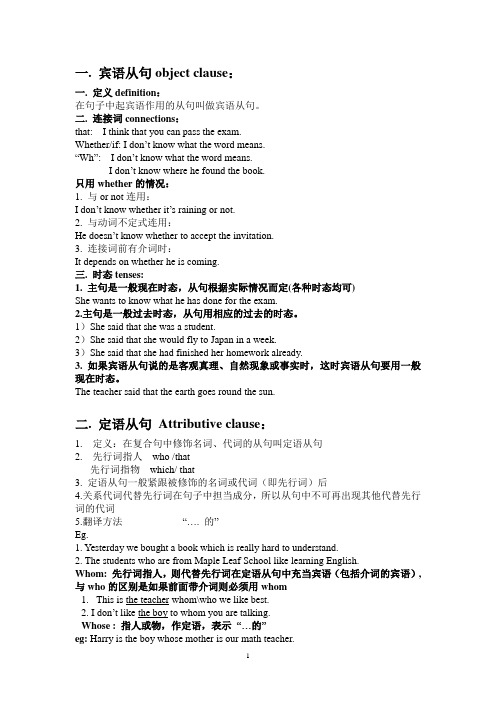
一. 宾语从句object clause:一. 定义definition:在句子中起宾语作用的从句叫做宾语从句。
二. 连接词connections:that: I think that you can pass the exam.Whether/if: I don’t know what the word means.“Wh”: I don’t know what the word means.I don’t know where he found the book.只用whether的情况:1. 与or not连用:I don’t know whether it’s raining or not.2. 与动词不定式连用:He doesn’t know whether to accept the invitation.3. 连接词前有介词时:It depends on whether he is coming.三. 时态tenses:1. 主句是一般现在时态,从句根据实际情况而定(各种时态均可)She wants to know what he has done for the exam.2.主句是一般过去时态,从句用相应的过去的时态。
1)She said that she was a student.2)She said that she would fly to Japan in a week.3)She said that she had finished her homework already.3. 如果宾语从句说的是客观真理、自然现象或事实时,这时宾语从句要用一般现在时态。
The teacher said that the earth goes round the sun.二. 定语从句Attributive clause:1.定义:在复合句中修饰名词、代词的从句叫定语从句2.先行词指人who /that先行词指物which/ that3. 定语从句一般紧跟被修饰的名词或代词(即先行词)后4.关系代词代替先行词在句子中担当成分,所以从句中不可再出现其他代替先行词的代词5.翻译方法“…. 的”Eg.1. Yesterday we bought a book which is really hard to understand.2. The students who are from Maple Leaf School like learning English.Whom: 先行词指人,则代替先行词在定语从句中充当宾语(包括介词的宾语), 与who的区别是如果前面带介词则必须用whom1.This is the teacher whom\who we like best.2. I don’t like the boy to whom you are talking.Whose : 指人或物,作定语,表示“…的”eg: Harry is the boy whose mother is our math teacher.关系代词只能that 的特殊情况:1.先行词前有序数词修饰时:This is the first gift that my parents bought me.2.先行词前有形容词最高级修饰时:This is the most exciting film that I have ever seen.3. 先行词是不定代词something, anything等时.e.g. Is there anything that you want in this shop4. 先行词是人和物时, 用that.e.g. He talked about some writers and books that were unknown to us all.5. 先行词被all , little , the only , the very(就是,正是), the last 等词修饰时,只能用thate.g. This is the last place that I want to visit.6. 特殊疑问句以who 或which 开头,只能用that引导.Who is the girl that is making a speech on the platform?当关系代词前使用介词时:物+介词+which ; 人+ 介词+ whom当关系代词前使用介词时:e.g. 1. This is the train by which we went to Beijing.2. This is the teacher to whom my mother is talking.三. 状语从句:Adverbial clauses定义:在复合句中由从句表示的状语称作状语从句,它可以用来修饰谓语(包括非谓语动词)、定语或状语,或是整个句子。
英语三大从句类型总结

英语三大从句类型总结PART1:英语从句三大类型按一般说法,可分为三大类14种从句。
一,名词性从句1主语从句Whether it's right or not remains to be seen.2宾语从句I wonder whether it's right or not.3同位语从句This is a question whether it's right or not.4表语从句The question is whether it's right or not.二,定语从句1限定性定语从句She is the student who can speak English well.2非限定性定语从句She is the student,who can speak English well.三,状语从句1时间状语从句The fact will come out when he comes here.2地点状语从句You can go wherever you like.3原因状语从句Pay more attention to your lessons because you are a student. 4方式状语从句He walks as if he were a king.5目的状语从句She went to Japan so that she could learn Japanese well.6结果状语从句She went to Japan so that she learned Japanese well.7条件状语从句I will understand it if he tells me.8让步状语从句He knows a lot though he is little.PART2:经典名词性从句主语从句subject clauses在复合句中起主语作用的从句叫主语从句。
英语笔译定语,状语,名词性从句及汉语特殊句式翻译例句

定语从句译法(一)译成前置定语(二)后置并列分句(三)溶合译法(四)译成状语●The traders wanted safe access to large quantities of Oriental spices,which the European world had come to like, and which people needed for presenting food in days before the introduction of cold storage.商人们想平安无事地获取大量的东方香料,这些香料已经为欧洲人所喜爱,而且在没有发明冷藏法的当时,香料也是人们储藏食品所必须的。
●I had seldom met an American who served in China during World WarII who had not known Zhou Enlai.二战期间曾在中国工作过却不认识周恩来的美国人很少见。
●译成前置定语:●This is the soldier who just returned from the front.译文:这是刚从前线回来的战士。
●To be sure, a great rebuilding project would give jobs to those ofpeople who need them.译文:诚然,一个宏伟的重建计划也许能为许多需要工作的人提供就业机会。
●In recent years, however, people have begun to become aware thatcities are also areas where there is a concentration of problems. 可是,近几年来人们开始意识到城市也是问题成堆的地方。
●Chemistry deals with changes in matter as a result of which it ispossible to form a new substance.译文:化学是研究物质变化的,这种变化的结果能够形成新的物质。
三大从句的翻译

翻译成状语从句
He likes Miss Lei, who despises him. 尽管雷小姐讨厌他,他却很喜欢她。(让步 状语) Washington who could have been king insisted that ultimate sovereignty lay with the people. 虽然华盛顿本来可以成为国王,但是他却坚 持认为最高权利属于人民。(让步状语)
名词从句:概略法
That is where we differ. 这就是我们分歧所在. That nobody was killed or even slightly injured in such a serious accident was incredible. 如此严重的事故竟然无一人伤亡,真叫人难 以置信!
曹氏译法
I had found the charm of the picture in an absolute life-likeliness, which at first startling, finally confounded, subdued and appalled me.
我发现这副画栩栩如生,魅力十足。一开始让我吃 惊,最后令我困惑,把我折服,使我丧胆。 我感觉到了这副画栩栩如生的魅力,这种一开始让 我吃惊、最后令我困惑、把我折服、使我丧胆的魅 力。
他们在为珍藏于中国人心中的那个理想而奋斗。过 去,为了这个理想,很多人献出了生命。 他们正在努力实现那个理想,那个每位中国人心中 的理想,那个许许多多为之献出生命的理想。
曹氏译法
Seek not proud riches, but such as you may get justly, use soberly, distribute cheerfully, and leave contentedly. 勿因摆阔而追求财富,只挣取之有道、用之 有度、施之有乐、遗之有慰之财。(培根)
三大从句的翻译

曹氏译法
首先翻译出定语从句前的主句,然后重译先行词 (或者是把代表先行词的关系词还原为先行词), 再把定语从句翻译成定语置于被重复的先行词之前。 I want a man who will throw his hat over the Chindwin (一江名),then lead his troops after it. 我需要的是这样一个人,他决心在钱墩江破釜沉舟 然后带领部队前进。 我需要的是这样一个人,一个能在钱墩江破釜沉舟 并且率部队过江的人。
翻译成独立的句子
The problem of development vs. environment has now been in the limelight. Nowhere is the clash more visible in China, where the word’s largest population faces pollution, deforestation on a large scale. 现在发展与环境已经成为人们关注的中心。在中国 这对矛盾表现得特别突出。这个世界上人口最多的 国家。面临着环境污染和森林大规模减少的侵袭。
曹氏译法
Sometimes when he came he was silent and moody, and after a sarcastic remarks went away again, to tramp the streets of Lincoln, which was almost as quiet as those of Black Hawk. 有时他来后会少言寡语、闷闷不乐,发几句尖刻的 议论后又转身离去,继续漫步于林肯市的那些大街, 那些几乎和黑鹰镇的街道同样冷清的大街。
一个句子搞定英语的三大从句
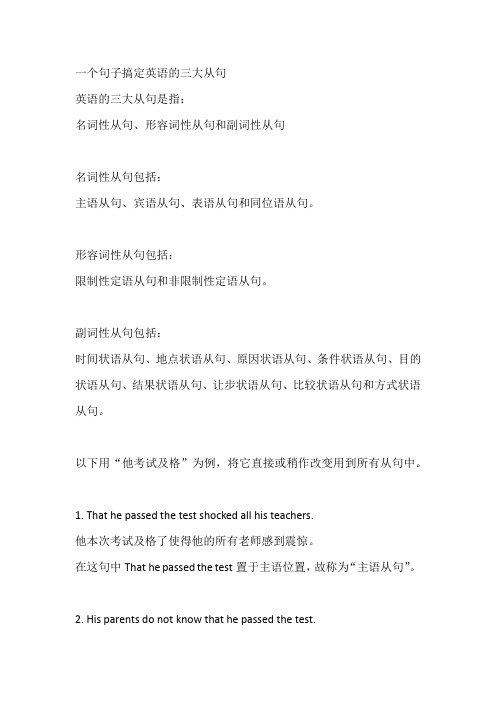
一个句子搞定英语的三大从句英语的三大从句是指:名词性从句、形容词性从句和副词性从句名词性从句包括:主语从句、宾语从句、表语从句和同位语从句。
形容词性从句包括:限制性定语从句和非限制性定语从句。
副词性从句包括:时间状语从句、地点状语从句、原因状语从句、条件状语从句、目的状语从句、结果状语从句、让步状语从句、比较状语从句和方式状语从句。
以下用“他考试及格”为例,将它直接或稍作改变用到所有从句中。
1.That he passed the test shocked all his teachers.他本次考试及格了使得他的所有老师感到震惊。
在这句中That he passed the test置于主语位置,故称为“主语从句”。
2. His parents do not know that he passed the test.他的父母不知道他本次考试及格了。
在这句中that he passed the test置于宾语位置,故称为“宾语从句”。
3. He looks happy. The reason is that he passed the test.他看上去很开心,理由是他本次考试及格了。
在这句中that he passed the test置于表语位置,故称为“表语从句”。
4. The fact that he passed the test shocked all his teachers.他本次考及格了这一事实让他的老师感到震惊。
在这句中that he passed the test置于同位语位置,故称为“同位语从句”。
除了用that引导,还可以根据具体的意思不同,用其它引导词引导。
例如:5.How he passed the test is still unknown to me.(主语从句)这次考试他是如何及格的我还不知道。
6. I don't know how he passed the test.(宾语从句)我不知道他这次考试如何及格的。
三大从句区别(定从-名词从-状从)
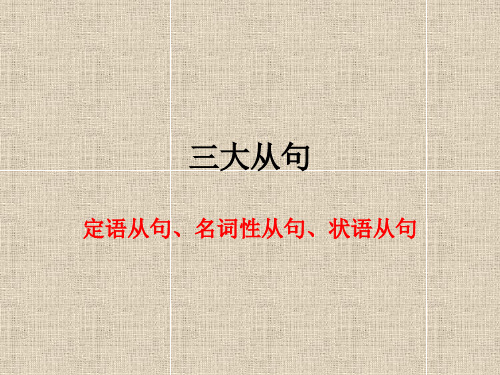
谢谢观看! 2020
5) 结果状语从句: 常用引导词:so … that, such … that,
6)条件状语从句:常用引导词:if, unless, as/so long as(只要), only if
7)让步状语从句:常用引导词: though,although, even if, even though as(倒装),while ( 一般用在句首 ), no matter+疑问词,疑问词+ever(如 whoever)
2. I found the wallet where you drank coffee . __地__点__状__语__从__句_____.
3. She sang as she walked home all the way. __时_间__状_语__从__句___. 4. Many people, as you know, are learning foreign languages. __定__语_从__句__________. 5. The news that our team has won the game was true. _同__位_语__从_句__________. 6. It was obvious that you’ve made a big mistake. _主__语_从__句__. 7. He will talk to us about what he saw in the school. ____宾__语_从__句________. 8. He looks as if he was going to cry. ____表__语_从__句________.
1)“当……的时候” James pretended to be deaf when I spoke to him.
高中英语三大从句解释

1、定语从句(形容词从句)2、名词词从句(包括主语从句,宾语从句,表语从句,同位语从句)3、状语从句(副词性从句,包括时间,地点,结果,目的,原因等)一、定语从句:定语从句(Attributive Clauses)在句中做定语,修饰一个名词或代词,被修饰的名词,词组或代词即先行词。
定语从句通常出现在先行词之后,由关系词(关系代词或关系副词)引出。
1、关系代词引导的定语从句关系代词所代替的先行词是人或物的名词或代词,并在从句中充当主语、宾语、定语等成分。
关系代词在定语从句中作主词保持一致。
(1), who, whom, that这些词代替指人,“whom”作宾语指人,“that”既可作主语又可作宾语(作宾语可以省略),可以指人也可以指物。
(2),Which 用来指人或物(用作主语、宾语,作宾语时可以省略)(3),whose“whose”表示谁(可以为人也可以为物)的(东西)2、关系代词引导的定语从句(1),关系副词why主要用于修饰表示原因的名词(主要是the reason),同时它在定语从句中用作原因状语。
(2),关系副词when主要用于修饰表示时间的名词,同时它在定语从句中用作时间状语。
(3),关系副词where主要用于修饰表示地点的名词,同时它在定语从句中用作地点状语。
3、非限制性定语从句它起补充说明作用,缺少也不会影响全句的理解。
在非限制性定语从句的前面往往有逗号隔开。
二、名词性从句在句子中起名词作用的句子叫名词性从句(Noun Clauses)。
名词性从句的功能相当于名词词组, 它在复合句中能担任主语、宾语、表语、同位语、介词宾语等,因此根据它在句中不同的语法功能,名词性从句又可分别称为主语从句、宾语从句、表语从句和同位语从句。
引导名词性从句的连接词可分为三类:1、连词(5个):that (宾语从句或表语从句中that有时可以省略)whether,if (均表示“是否”表明从句内容的不确定性)as if ,as though (均表示“好像”,“似乎”)以上在从句中均不充当任何成分2、连接代词(9个):what, whatever, who, whoever, whom, whomever, whose, which, whichever3、连接副词(7个):when, where, how, why, whenever, wherever, however三、状语从句状语从句(Adverbial Clause)状语从句指句子用作状语时,起副词作用的句子。
中考英语重点语法三大从句总结
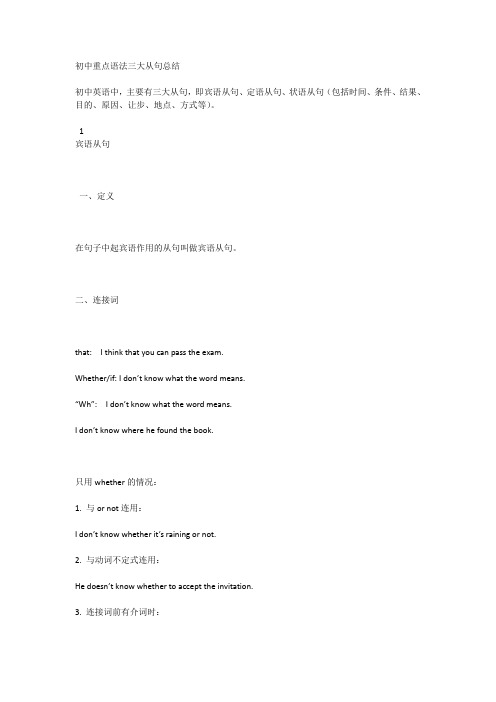
When the children had gone to bed, she began to prepare her lessons.
While ---在……期间,往往指一段时间。
While we were inAmerica, we saw him twice.
While ---表示一种不满情绪,意思是这边在干某种重要的事,而另一边在享受等。
If ---如果
If you don’t hurry up, you will miss the plane.
Unless ---如果不,除非=if not
We can’t get there on time unless we book the earliest flight
As long as ---只要
We will succeed as long as we keep on trying.
As (so) far as ---据……所知
As far as I know, he speaks English very well.
In case ---假使,如果
The plane cannot take off in case it rains.
Wherever ---无论哪里
Wherever you are, I will be right there waiting for you.
4.原因状语从句
because, as, since, now that,和considering that, seeing that这六个连词都用于表示表示原因,但在语气上一个比一个弱.
It is just a week since we arrived here.
- 1、下载文档前请自行甄别文档内容的完整性,平台不提供额外的编辑、内容补充、找答案等附加服务。
- 2、"仅部分预览"的文档,不可在线预览部分如存在完整性等问题,可反馈申请退款(可完整预览的文档不适用该条件!)。
- 3、如文档侵犯您的权益,请联系客服反馈,我们会尽快为您处理(人工客服工作时间:9:00-18:30)。
By Yolanda
三大从句的翻译方法
• 名词性从句, • 形容词性从句 • 状语从句
名词性从句
• what, how, whether, that, where, when, 引导的名词性从 句,用来做主语,宾语,表语,介 词宾语或者同位语
状语从句
3.Though引导 Though引导的从句可放在主句前,也 可放在主句后面。 翻译不同:在前翻译为“虽然…“、”尽 管...”; 在后翻译为“可是”,“不过”,“然而”
状语从句
Thought the task was difficult, they managed to accomplish it in time. 虽然任务艰巨,他们还是设法及时完成了。 He was old and poor, though he was happy 他又老又穷,但过得却快活。
状语从句
• 特殊状语从句 1.That引导 2.Before引导 3.Though引导 4.Because引导 5.Until 引导
状语从句
1.That引导 1)“the+形容词或副词比较级 +that从句” 表示原因。 the act was the bolder that he stood utterly alone.
常翻译为独立的分句,或独立从句
名词性从句与形容词性定语从句
从成分来看: • 名词性从句,做主语,宾语,表语,介词宾 语或者同位语; • 形容词性定语从句,在句子中作定语; 从结构来看: • 名词性从句,前面没有要修饰的名词; • 形容词性定语从句,前面有要修饰的名词。
That名词性从句与that引导的形容词性 定语从句 eg: that you have done such a stupid thing was incredible. eg: I saw the cat 【that caught the rat】 【that ate the grain】 【 that in the house】 【that jack built】.
• 你们英国女人每天狼吞虎咽的吃三到 五餐肉食,你拿她和她们比,当然觉 得她是个苗条仙女了。 放在主句前面,为了强调
形容词性从句
3.翻译为状语从句
• The thief who was about to escape was caught by the police. • 小偷要跑时,被警察抓住了。
状语从句
1.That引导 4)“the rather that从句)” 表示 原因,翻译为“因为……”。 I „m glad of it, the rather that you will benefit by it.
我感到高兴,因为它对你有益。
状语从句
1. That引导 5)“for all that从句)” 引导让步状语 从句, 翻译为“尽管…””虽然…“。 For all that he seems so badtempered, I still think he has a very kind nature. 尽管她好像脾气很坏我仍然认为他心 地善良。
名词性从句
• What引导
eg: 【what was once regarded as impossible】 has now become a reality.
过去认为不可能的事现在已经成为现实。
eg: 【 what someone chooses to observe 】 and the way one observes it must, after all, in part be a reflection of experience and of ideas as to 【 what is significant 】.
状语从句
1. That引导 6)“but that从句” 引导让步状语从句, 翻译为“要不是…的话“”如果不是… 的话”。 but that he helps, I should fail. 要不是他帮忙的话,我就失败了。
状语从句
1. That引导 7)“so much so that从句” 相当于 “to that extent so that”, 翻译为 “甚至“”以至于…”,“因此”等等。 he is very ignorant so much so that he cannot read his own name. 他非常无知,甚至连自己的名字都不 认识。
形容词性从句
限定性定语从句与非限定性定语从句
• The thief who was about to escape was caught by the police. • The thief, who was about to escape, was caught by the police. • They are short of sticks to make frames for the climbing vines, without which the yield of grape would be halved.
什么时候开始工作还没决定呢。
• where 引导 Eg: that‟s 【where we differ】. 这就是我们的分歧所在。
总结: when引导, where 引导名词性从句, 直接翻译“…时候”“…地方”。
名词性从句
• that引导 eg: 【 that you have done such a stupid thing】 was incredible.
他干多少并不重要,问题是他到底有没有干。
I wonder 【 whether he will come in such a bad day】. 我不知道在这样的天气里他是不是能来 总结: whether引导名词性从句,翻译为
双重否定“是不是,能不能….”
名词性从句
• when引导 eg: 【 when we will begin to work】 has not been decided yet.
状语从句
1. That引导 3)“not that…but (that)” 表示原因, 翻译为“不是因为…而是因为…”。 it is not that I am unwilling to go with you, but that I‟m busy now. 不是因为我不愿意跟你一起去,而是因为我 现在很忙。
形容词性从句
1.前置定语 • This is the reason 【why I am not in favor of revising the plan】. • 这就是我不赞成修改计划的原因
翻译为“…的”+前面的名词
形容词性从句
2.翻译为独立的并列分句
• They are short of sticks to make frames for the climbing vines, without which the yield of grape would be halved.
你竟然做这么傻的事情,(这)真叫人难以 置信。 总结:that 引导的名词性从句常常表示强烈 愿望或惊讶,愤怒等。 如果that从句过长,常常在后半句加上 “这”。
形容词性从句
• Which,why, that, who, where, when,as引导, 常作定 语,但是还表示原因,转折等含意, 翻译要变通处理。
我不知道该如何做。
That was 【 how they were
defeated 】.
他们就是这样给打败的 总结: how引导名词性从句,翻译为“ 如
何…,这样…,那样….”
名词性从句
• whether引导 eg: it isn‟t much 【 whether he works】; the question is 【 whether he works at all 】.
名词性从句
eg: 某人选择观察的事物和他观察的方式 在某种程度上一定反映这个人的经历和他 关于重大的事件的看法
总结:what引导名词性从句,翻译 成名词,“…的事(情)”,在句子 中做主语,宾语,表语,介词宾语或 者同位语
名词性从句
• how引导
eg: I don‟t know 【 how to do 】.
状语从句
2.Before引导 Before引导状语从句表示“在…之前” 但由于汉英表达方式不同,翻译成 汉语时,表达有多种。
Be a pupil before you become a teacher. 做先生之前,先做学生. 先做学生,再做先生.
状语从句
2.Before引导
Before I could say a single word, he ran away. 在我能说一句话之前,他跑掉了。 我连一句话也没来得及说他就跑了.
状语从句
4. Because引导 Because引导的从句, 主句是肯 定的,主句是否定的,翻译不同, 要根据上下文的内涵逻辑而定。
状语从句
4. Because引导
I didn’t go because I was afraid。
我不是因为害怕才去的。 He cannot go to school because he is sick. 他因为生病不能上学。
He must be ill, for he is absent 他肯定是病了,因为他没来。 他没来,肯定是病了。
状语从句
• When we were about to get away, a police car came to the front door.
1)当我们正要离开的时候,一辆警车 来到了前门。 2)我们正要离开,一辆警车来到了前门。 翻译壮语从句时,省略连词可以使译文 更简洁通俗。
形容词性从句4.翻译为谓语 Nhomakorabea构或者宾语结构
